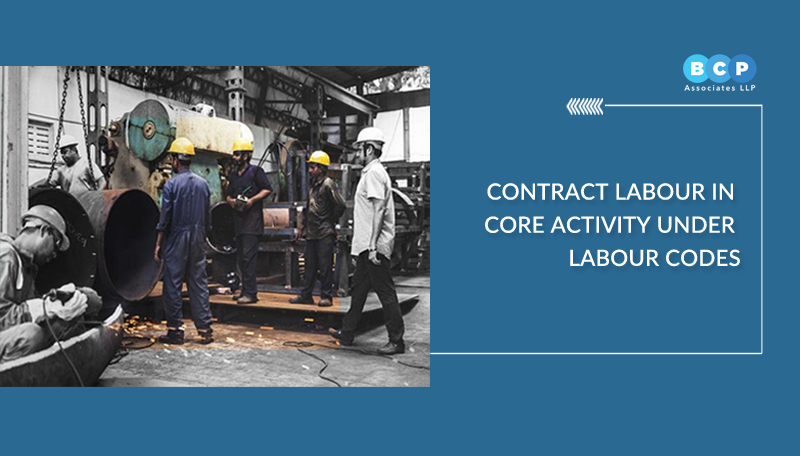
Introduction
The engagement of contract labour has observed a significant rise in number across various establishments. The ratio of contract workers to regular employees in IT companies is shifting at a fast rate. The Government of Andhra Pradesh has amended the provisions of the Contract Labour Act (‘CLRA Act’) stipulating the core and non-core activities. As per the State amendment, employment of contract labour in core activities is prohibited in Andhra Pradesh and Telangana. However, there is no such prohibition in Karnataka for engaging the contract labour in the core activities as in the case of Andhra Pradesh. With the introduction of the new labour codes, the CLRA Act will be subsumed by the Code on Occupational Safety, Health and Working Conditions, 2020 (‘OSH Code’) bringing in major changes relating to the engagement of contract labour. One such change is the prohibition of contract labour employment in core activities of the establishment.
What is Core Activity?
As per Section 2(p) of the OSH Code, 2020, ‘Core Activity’ refers to any activity for which the establishment is set up and includes any activity which is essential to such activity. There are certain activities excluded from the purview of core activities such as sanitation works, catering and canteen services, laundry and housekeeping services, watch and ward services, etc. provided that such activities shall not be considered as an essential or necessary activity, if the establishment is not set up for such activity.
Given the above definition of Core Activity, there are certain exceptions. The principal employer can engage contract labour in core activities in the following circumstances:
- Where the normal functioning of the establishment is such that the activity is done through contractors.
- When there is a sudden increase in the volume of work to be completed within a specified period.
Engaging Contract Labour in Core Activity of an Establishment – The Right Way
Usually, companies engage contract labour in their core activities in the manufacturing sector. Many global MNC’s in India whose primary nature of work is IT/ITES are engaging IT vendors as contract labour to carry out their core work or the same or similar kind of work to that of their permanent employees. Such companies engaging vendors in their core activity exposes them with risk of non-compliance with the laws and may attract imposition of penalties under the New Codes.
To mitigate the risk, companies should examine and consider a few aspects before engaging contract labour;
- Determine the primary nature of work of the contractor’s establishment
- Determine the nature of the agreement between the company and the contractor
- Understand if the contract labour is engaged on a project basis or hourly basis
If the contract labour is engaged on a project basis, then the contract will come to an end at the completion of the project. If the contract labour is engaged based on business needs (or hourly basis), it might be to meet the contingency of sudden increase of volume of work in the core activity which needs to be accomplished within a specified time. The same may be justified from the perspective of requirements of the Code and benefits of exceptions as mentioned above may be taken.
Given the above, companies will have to gear up to justify their position regarding engagement of contract labour in the core activity within their organizations after the Labour Codes come into force.
Conclusion
Companies would be required to identify and understand their core activity, as defined under the proposed OSH Code. This would help them streamline the process of engaging contract labour. In case organizations opt to deploy contract labour in their core activity, it must be noted that the same should be done in compliance with the requirements of the Code.
– Gayatri Manjunath, Advocate and Associate